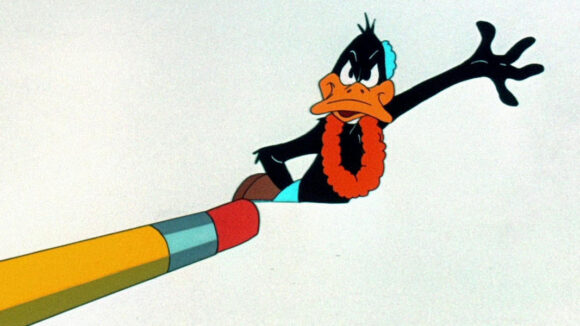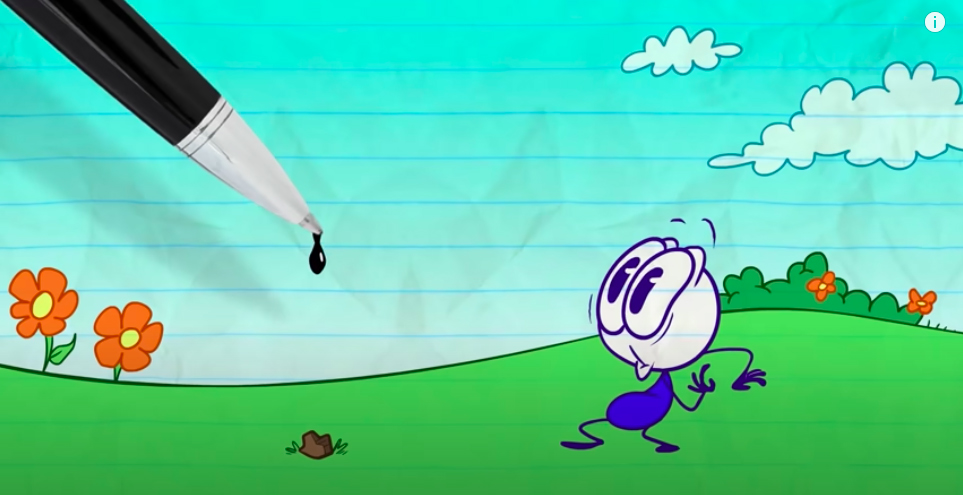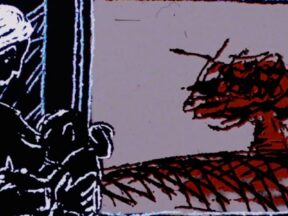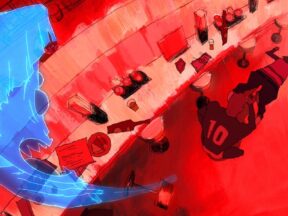

The Animation That Changed Me: Ross Bollinger on ‘Duck Amuck’
Ross Bollinger checks in for this week’s edition of The Animation That Changed Me, a series in which leading artists and industry figures discuss one work of animation that deeply influenced them.
Bollinger is the creator of the Pencilmation, a web series that humorously depicts a doodle’s ongoing struggles with his creator. It has racked up almost nine billion views on Youtube, becoming one of the platform’s most popular animation channels. Bollinger’s choice is Duck Amuck, Chuck Jones’s classic Merrie Melodies short, in which an irate Daffy Duck enters into a dialogue with the animator drawing him. Over to Bollinger:

I absorbed all of the classic Looney Tunes as a kid every Wednesday at my grandparents’. We didn’t have cable tv at home, so I think I may have pioneered the concept of “binge watching” during those sessions. It was on one of these long Wednesday afternoons as an elementary schooler that I first encountered Duck Amuck, and the metaphysical implications of “the artist manipulating the character” were absolutely mind-blowing. I was transfixed. Witnessing Daffy Duck coming apart at the seams as his world was literally deconstructed in front of him by the almighty artist, who ultimately turns out to be his arch-nemesis Bugs Bunny — it was sheer genius!
There are so many incredible Looney Tunes and Merrie Melodies that it would be impossible to name them all. Chuck Jones, Friz Freleng, Tex Avery, and many other incredible talents set the comedic character animation bar very high over the course of their prolific careers, and I believe few studios have come close to what Warner Bros. (and Disney) did at this time. And to think they did it all on paper without a single computer! The masterful execution of the animated medium during the golden age of animation is quite nearly perfect and is a daily inspiration.
Watch an excerpt of “Duck Amuck” below:
At age 16, I was teaching myself Macromedia Flash. After having watched Duck Amuck, I decided to create my own rendition of the “creator versus creation” concept, calling it Pencilmation. That cartoon turned out to be the first episode in my eponymous animated web series. I can say with certainty that that animation quite literally changed me!
I believe the entire Merrie Melodies cartoon division was started as a way to market sheet music from the Warner Bros. library. Can you imagine if Warner Bros. started a cartoon division today for the purpose of having animated characters dance to the likes of Bruno Mars and Rihanna?
What started out as a ploy to promote their music investments evolved over a couple of decades into the creation of some of the world’s most iconic cartoon characters. What a testament to creativity! Put a bunch of talented people in one place and let them create, and magic will happen! (As long as you have a deadline … haha.)

I can’t think of any flaws in Duck Amuck, and even if I could, who would I be to critique the classics? Is there anything that Shakespeare doesn’t do well in Hamlet? Or anything Milton doesn’t do well in Paradise Lost? Once a classic has been cemented in human history, one tends to only study what its creator did right. Looney Tunes form a sturdy pillar in the brief history of cartoon animation, and I would feel silly to even attempt to point out their flaws …
Is the relationship between creator and creation meaningfully different in the age of digital animation? In some ways, yes. The computer presents the digital animator with all kinds of tempting little shortcuts, but the truth is that nearly all of them are severely detrimental to the overall aesthetic of the creation. Digital animation — particularly cgi — simply does not age well, whereas classic hand-drawn animation is timelessly beautiful.
But you can’t blame the computer. After all, it has only existed for a few decades, compared to the pencil and brush which have been around for millennia! It is the hasty creator who is at fault for being tempted by the shortcuts, but there is no substitute for hard work and dedication, especially in animation!
There are other examples of “meta” storytelling in animation that I admire. Don Hertzfeldt’s Rejected comes to mind immediately as a hilariously surreal take on meta storytelling: “Mah spoon is too big!” Hertzfeldt was the analog harbinger of the entire “random comedy” movement on the early internet! Brilliant!
[Osvaldo Cavandoli’s] La Linea is another one. Hundreds of episodes of the artist torturing his creation, with a distinctly Italian design flair and comedic twist, accompanied by catchy 1970s music.
Of course, I’ve rewatched Duck Amuck often. That moment when Daffy tries to strum his guitar instead of musical notes, it suddenly starts rattling like a machine gun, and you realize that the artist is not only manipulating the picture but also the sound. It gets me every time!

.png)


